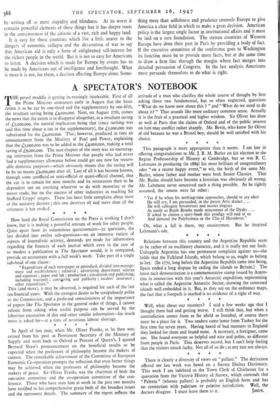In April of last year, when Mr. Oliver Franks, as
he then was, retired from his post as Permanent Secretary of the Ministry of Supply and went back to Oxford as Provost of Queen's, I quoted Bernard Shaw's pronouncement on the beneficial results to be expected when the professors of philosophy become the makers of cannon. The remarkable achievement of the Committee of European Economic Co-operation prompts the reflection that even better things may be achieved when the professors of philosophy become the makers of peace. Sir Oliver Franks was the chairman of both the executive committee and the co-operation committee of the con- ference. Those who have seen him at work in the past two months have testified to his comprehensive grasp both of the broadest issues and the narrowest details. The summary of the report reflects the
attitude of a man who clarifies the whole course of thought by first asking those two fundamental, but so often neglected, questions " What do we know now about this ? " and " What do we need to do about it? " That sounds like mere ordinary common sense. Actually it is the fruit of a practical and higher wisdom. Sir Oliver has done so well at Paris that the claims of Oxford and of the public interest on him may conflict rather sharply. Mr. Bevin, who knew Sir Oliver of old because he was a Bristol boy, should be well satisfied with his choice.


































 Previous page
Previous page